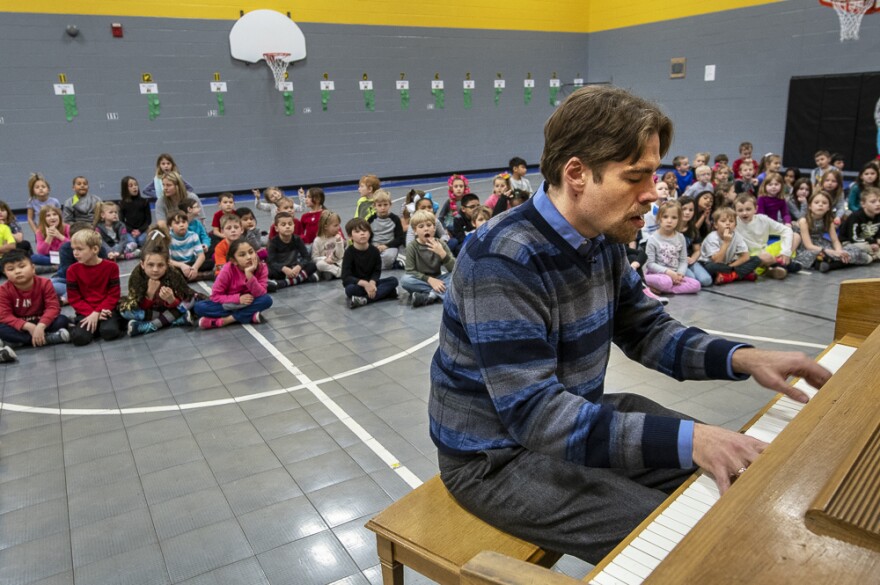Ragtime is big with the kids in Sedalia.
One day this spring, about 100 of them cheered for William McNally, a two-time winner of the World Championship Old-Time Piano Playing Contest. His performance at Sacred Heart School quickly won them over with the lively music that was all the rage 120 years ago.
“It’s kind of like making you want more," said Thomas Jenkins, 11, who had been taking piano lessons for about a year.
"It’s fun. It’s joyful, happy and you’d want to listen to it over and over,” he said of the antiquated musical style.
That's one point of Sedalia's annual Scott Joplin Ragtime Festival, which celebrates the biggest celebrity to come out of the mid-Missouri city.
Scott Joplin had been dead for 50 years in 1973, but his music was suddenly everywhere when it was part of the soundtrack for the Oscar-winning movie "The Sting," starring Paul Newman and Robert Redford.
The next year, organizers started the annual Scott Joplin Ragtime Festival, and since 1974, hundreds of musicians have come to Sedalia from all over the world for the week of concerts, workshops, lectures and jam sessions to celebrate Scott Joplin.
In his day, Joplin was known as “The King of Ragtime.” His father had been enslaved until the end of the Civil War, and Joplin moved to Sedalia as a teenager in the 1890s. It was a booming railroad town full of people seeking entertainment, and Joplin worked there performing ragtime tunes in many of the bars and social clubs.

"I feel like the more one knows about the history of the composer and the history of the social environment that they were living in when they wrote a piece. This tells me a lot about what they were thinking and feeling and then I try to bring that stuff to a performance," says McNally, who has spent a decade visiting Sedalia's schools and teaching kids about Joplin.
"Part of my job as a performer is to figure out how to connect this music, which is really just a bunch of black dots on a piece of paper, with a listening audience who needs the music to do something for them," McNally says.

When Joplin's jaunty "Maple Leaf Rag" was published in 1899, it was an instant sensation.
"'Maple Leaf Rag' is a rhythmic institution with some unexpected harmonies, McNally says. "Joplin found ways to syncopate that were utterly unique and totally more advanced. So it wasn't that 'Maple Leaf Rag' was an accidental hit. No, it very very deliberately did musical things that had prior to the 'Maple Leaf Rag' just not been achieved."
Joplin longed to have his work taken seriously, but many considered ragtime to be the music of bars and dance halls. So he turned to his hand to Western art forms like opera and ballet. But audiences just weren't ready for a ragtime opera. Joplin's 1911 opera "Treemonisha" doomed him financially. He died in obscurity in New York City on April 1, 1917.

But Joplin's music was not forgotten. Ragtime influenced both jazz and blues. His soundtrack for "The Sting" renewed interest in his music and in 1976, Joplin was awarded a posthumous Pulitzer Prize. A couple of years ago, on the 100th anniversary of his death, pianist Richard Dowling performed his complete piano works at Carnegie Hall.
Kathleen Boswell, who is on the board of the foundation that hosts Sedalia's festival, says learning about Scott Joplin and the music he made famous is learning about the history of Sedalia.
"All kinds of people have come to America and made us really famous for different things," she says. "Telling Scott Joplin’s story and then also telling the kids how important their hometown is. This is ground zero for ragtime.”

She says the key to keeping this music alive is to keep playing it.
"We want the young kids to get interested in it, get inspired by it, and to feel like it's their music, Boswell says. "They can wiggle and get into the music as much they want to and I love that."
And for Thomas Jenkins, seeing McNally's performance inspired him to return to his piano lessons with renewed enthusiasm.
"I really want to learn to play it (ragtime) on the piano," he said before heading back to class.
"I don’t see the end of ragtime’s popularity," says Boswell with a grin. "At least not on my watch.”
Julie Denesha is a freelance photographer and reporter for KCUR. Follow her on Twitter, @juliedenesha.


